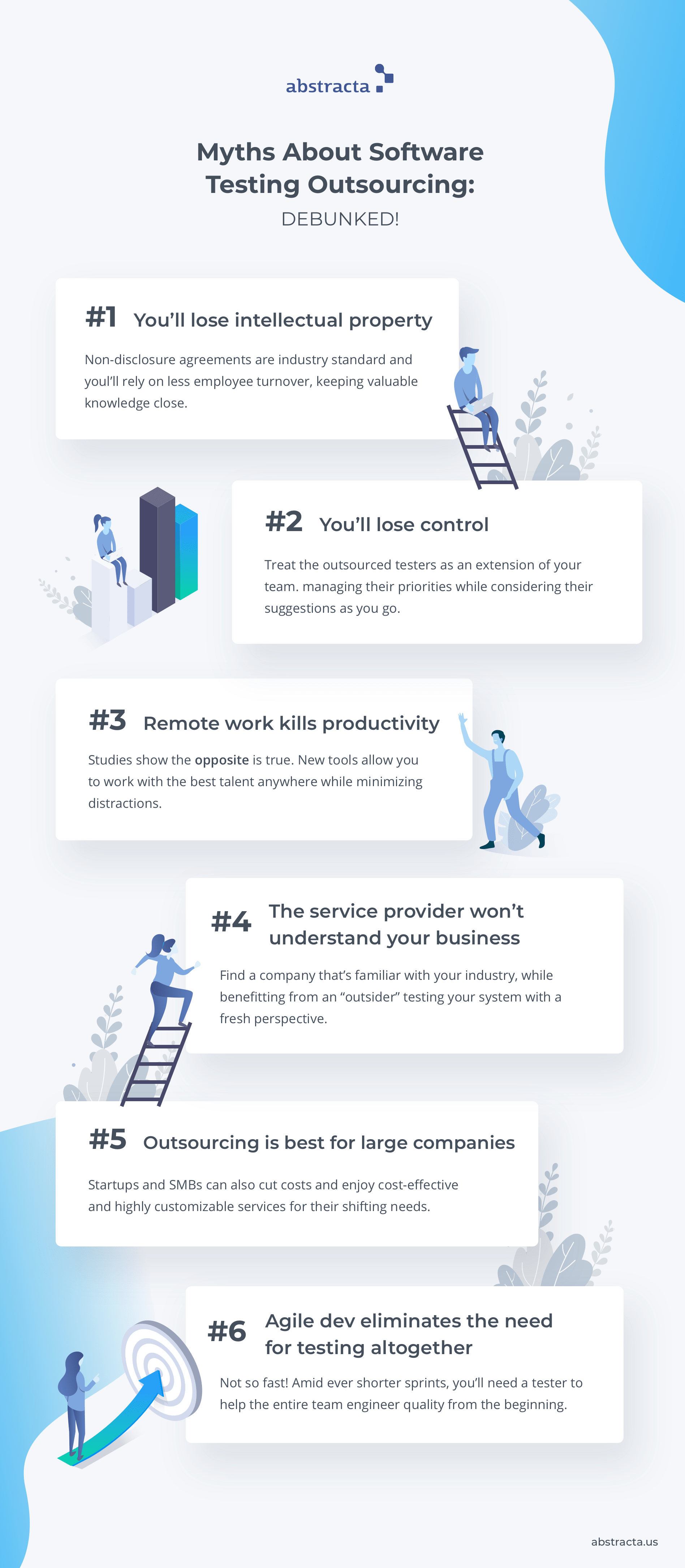Putting to bed your fears about outsourcing software testing and QA once and for all
Have you turned your back on the idea of outsourcing your software testing and QA (what we prefer to call quality engineering)? Maybe it was brought up once during a meeting but shot down right away because someone mentioned the issue of losing intellectual property, the hassles of working with a remote team, etc.
If this sounds familiar, we encourage you to let us debunk these common software testing outsourcing myths and just maybe, open you up to its potential benefits!
Why Outsource Software Testing?
First of all, why do companies opt to outsource their software testing?
The purpose of outsourcing is to free you up to concentrate on your core competencies.
For example, if you hired the world’s best developer with little testing experience, would you want her to be bogged down with figuring out how to test her stellar code during the final hour before release?
Of course not! But, you don’t want the product to go untested altogether and then have frustrated users report bugs that will later take her hours to fix (a classic consequence of technical debt).
A better alternative is to have someone test her code as she goes. In this case, the tester would suggest improvements while detecting bugs as they appear. This way, testing is no longer a bottleneck at the end of the dev cycle and the company can release with the utmost confidence.
What outsourcing testing comes down to is finding a trusted partner to accomplish a project or ongoing task in QA that you could do yourself, but do it better, faster, and more expertly.
Not to mention, the burden of having to recruit, interview, hire, on-board, and train a tester is completely passed on to the testing company and taken off your plate.
Now, let’s look at some of the myths of software testing outsourcing that may be keeping you from experiencing its benefits!
Software Testing Outsourcing Myths
1. Outsourcing Leads to Loss of IP and Internal Knowledge
There are actually several ways that software testing providers can help you combat this.
Can you rely on your employees not to leave your company and take their knowledge with them? It’s no secret that today’s top tech talent are notorious job hoppers, including those who work for even the most popular companies like Facebook, Uber, Google, etc. The average Facebook employee only stays for about 2.02 years, which is, surprisingly, on the high end of the spectrum; Amazon employees jump ship after just 1 year on average.
There’s also the issue of your own employees changing roles and having to train their successors. Some of our clients have promoted, changed, or let go of team members and they were pleased by how we were able to provide continuity as far as testing is concerned.
At Abstracta, we also make sure to have several quality engineers who can work on behalf of another for our clients, so there’s always talent available and it’s on us to get our team members up to speed. This helps us to not slow down a project just because one of our testers goes on vacation or takes leave.
Additionally, we are fortunate to enjoy a very low turnover rate; since we are fully dedicated to testing, our testers’ motivation is high, training opportunities are plenty, and opportunities to branch out into new areas are abundant. This results in a team that’s continuously challenged and here for the long-haul.
Most importantly, experienced outsourcing providers give high priority to signing confidentiality agreements or NDAs (Non-Disclosure Agreements) to protect trade secrets as well as comply with the strictest security measures, just like an internal team member would at your company.
2. You Lose Control to an Outsourced Team
There is often a lack of understanding about the role of the outsourced party in relation to the client. When you hire a software testing company, together you will create a Service Level Agreement in which you decide who is responsible for X, Y, and Z, but you will always remain in control of your project or product no matter what.
A good tester will speak up when they find ways to eliminate inefficiencies or suggest feature improvements, but they won’t implement them without prior consent.
To stay in control, you should work with the outsourced team just as you would your internal teams.
For example, at Abstracta, we often have clients arrange a weekly recurring conference call in which they define the priorities for the week, month, quarter etc. with their Abstracta test team. Our customer success managers make sure that the right progress is being made along the way and that we do more than just meet expectations.
3. Working with a Remote Team Kills Productivity
Many of those who oppose outsourcing fear that being in different locations will hamper communication and reduce productivity, but that’s a misconception.
Due to the current global pandemic, more and more teams are teleconferencing with tools like Zoom and send instant messages on Slack. And when you and your outsourcing partner actually do communicate face-to-face, the meeting is taken much more seriously. Every moment is filled with purpose as there’s no time to waste!
What about time differences? At Abstracta, our testers are located in San Francisco, California and Uruguay, which is just one hour ahead of New York. Believe it or not, a difference of a few hours can actually be preferable. For example, if you’re in California, you can ask for something at the end of the day your time and because your team is a few hours ahead, they can have it done for you by the time you arrive to work the next day. On the other hand, there is still enough overlap during the workday for important, real-time communications to be had.
Another advantage of outsourcing is that, since you are no longer restricted to working with people in your geographic area, you can hire the best and brightest minds, wherever they may be. A talented team of capable and experienced remote individuals will always be more productive than an in-house team of less qualified individuals who require more coaching and training to get up to speed.
Lastly, great outsourcing companies are flexible, willing to travel to the client’s location when possible and as needed for best outcomes.
4. The Service Provider Won’t Understand Your Business
Of course, your business is special, very special!
But, you might be surprised as to how quickly a third party can gain an understanding of your unique context and from there, design the best test plan for you. If you choose a company to work with in the long-term, it will be well worth the “getting to know you” period. Remember that the outsourcing company’s success is your success.
On the other hand, it can be especially advantageous to have an “outsider” test your product. After months or years of developing your amazing new app, you may have gone blind to certain things that a tester might find right away upon evaluating your app for the first time. This is when black-box testing comes into play and especially exploratory testing. When you go with a testing company, they even may rotate testers over time, helping to gain that invaluable “fresh look” at your app more often.
We admit, there are plenty of outsourcing providers to choose from. There is one for every niche, industry, or business you might be in. Find the right provider that is already familiar with your business, its goals, challenges, limitations, etc. For example, at Abstracta, we are well versed in testing healthcare and financial systems, which handle highly sensitive information, as well as helping retailers improve their online shopping experiences.
As a rule of thumb, pick a testing company with experience in your industry, a similar culture, and the right technical skills.
5. Outsourcing is Only for Large Enterprises
While global enterprises are known to leverage outsourcing to cut costs, there’s no reason why quickly growing startups and SMBs can’t reap the same benefits. Let’s say you only have enough room in your budget to hire one tester. That budget will go much further when you outsource to a software testing company because you’ll gain access to all of the testers they have, with a vast array of expertise in areas such as test automation, performance testing, mobile testing, etc. And, the services can be highly customizable for what you need at the moment. Essentially, you employ a Swiss army knife of testers instead of limiting yourself to having only one on hand while also reducing employee overhead.
As you gain more clients or customers and your testing demands increase, it’s faster to add testers to your outsourced team rather than hire new employees. What’s great is that the testing company already knows your product and can bring more team members on without you having to get them up to speed personally.
TRUE STORY: We partnered with a San Francisco startup, Threads, before its official product launch when it emerged out of stealth mode. Because of our solid partnership (for three years and counting), we continue working with them, helping to guide their testing strategy.
6. Agile Development Renders the Testing Role Irrelevant
With development and testing becoming more aligned than ever before thanks to Agile development and DevOps, testing shifts left to become an integral part of development.
Some may say that the individual test role is eliminated as developers run unit tests in a continuous integration and continuous delivery (CI/CD) scheme. While developers may run unit tests, you will still want to have more complex test cases in your test suite and add new types of tests like automation, security testing, performance testing, etc.
All of that is far easier said than done. A good tester is imperative for pulling off high quality software amid shorter sprints. At Abstracta, we consider ourselves to be quality engineers (Check out this other infographic on that!) as we apply engineering to different parts of the software development process for the benefit of quality.


So, how did we do? Did we debunk those myths and change your view about outsourcing software testing? Do any others come to mind? Let us know in the comments!
If you are interested in learning more about how Abstracta can help you with your test strategy and build your own QA team, get in touch!
Recommended for You
White Paper: 10 Mistakes Companies Make When Outsourcing Software Testing


Abstracta Team
Related Posts
Outsourcing Software Testing: What to Do and What to Avoid When Looking for a Testing Partnership
Finding the ideal outsourcing partner for your business can be a complicated task. Here are some key do’s and don’ts that will help you pick the right testing company for you. Outsourcing software testing has become a common and effective solution for many organizations that…
Debugging in Production with OverOps
OverOps, the self-proclaimed “God mode for production code” We are happy to share a new tool that we are excited about here at Abstracta, OverOps! Why? Well, simply put, it makes it easy to see where, when, and why your code breaks in production. My…
Search
Contents








